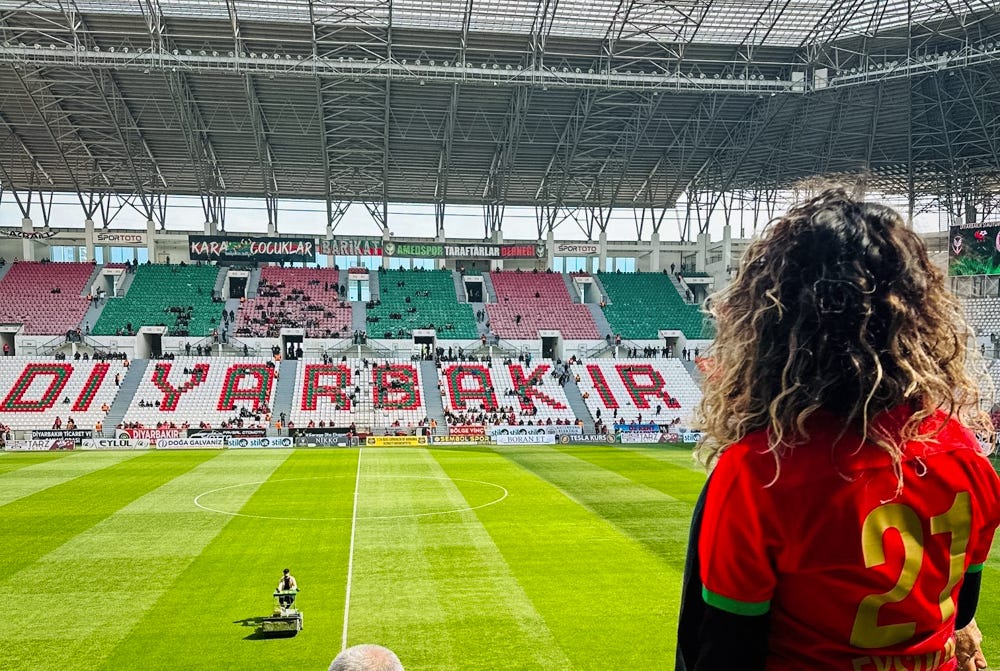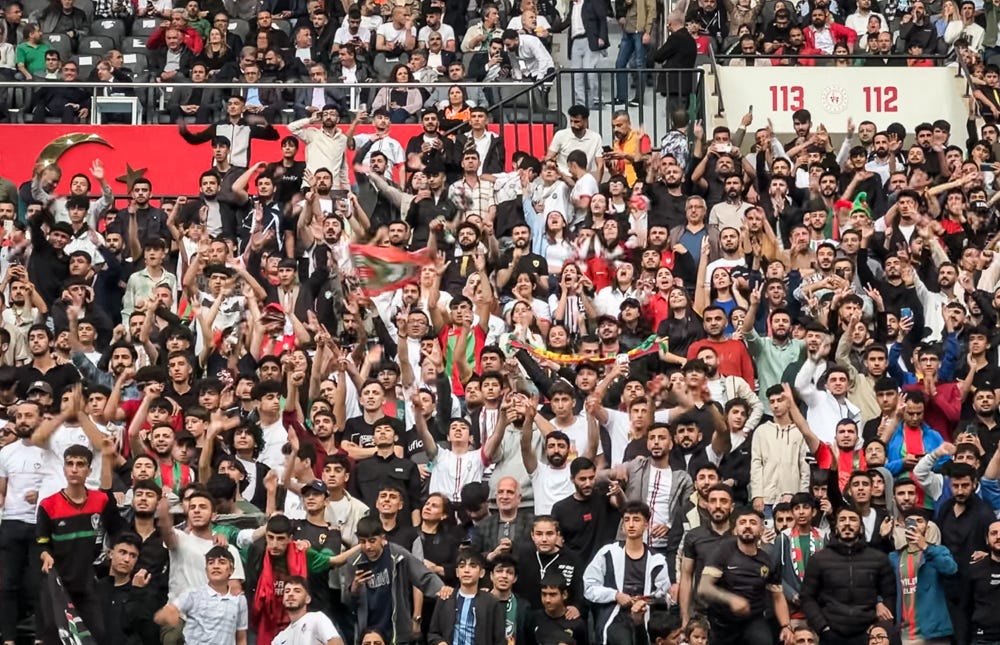DİYARBAKIR – "When Amedspor won the championship, I felt as happy as if Kurdistan had been established," Afife Kartal said, a 65-year-old Peace Mother.
Amedspor, which uses Diyarbakır's Kurdish name, Amed, was promoted to the nation’s first league after claiming the top spot in the Turkish Football Federation’s (TFF) 2nd League this spring – marking a breakthrough moment a team that has faced adversity and attacks, both on and off the field.
Tens of thousands of football fans followed the club’s final games in the 2023-2024 season. Amedspor's championship title was met with celebrations not only in Diyarbakır but also in other Kurdish-majority provinces despite years of fines, fan restrictions for away games and violence.
Speaking to Turkey recap, club officials, former players and fans emphasized that Amedspor represents all Kurds. They also noted the club’s success is a rare bright spot for a region long stifled by war, curfews and kayyıms, or the practice of replacing elected officials with state-appointed trustees.
"The team is ours. The children are ours," Kartal said, rejoicing at the team’s championship title. "I hung the Amedspor flag on my balcony, took my children, my 20-day-old grandchild, and joined the celebrations. As long as I'm alive, I'll go to the matches."
Football is never just football
Aziz Elaldı, president of Amedspor, says the team's success is the result of good management and its wide support base, regardless of political views.
"The prayers of the mothers were important to us,” Elaldı told Turkey recap. Anything embraced by mothers, women and children will succeed.”
He went on, saying Amedspor brought people in the region together and the championship was met with sweeping celebrations.
"There hadn't been such unity and victory for a long time,” Elaldı said. “The people's thirst for victory, the years-long yearning, has brought great enthusiasm."
Ali Fikri Işık, a football commentator and sports writer, compared the relationship between Amedspor and its fans to the bond Catalans have with FC Barcelona in Spain.
"For Kurds … Amedspor is undoubtedly Barcelona," Işık said, adding he views Amedspor as an example of how football is never just about football.
Originally founded in 1972, the football club that would become Amedspor went through many iterations and name changes before assuming the official title Amed Sportif Faaliyetler Kulübü in 2015.
The name change came after the collapse of the Peace Process between the Turkish government and the Kurdistan Workers’ Party (PKK) following the Islamic State siege of Kobani in northern Syria.
During the same period, the Amedspor became a target for a growing number of fines, bans and racist attacks against players, fans and officials.
Işık recalled how Amedspor faced attacks during an away game against Bursaspor in 2016. Later the same year, club officials were assaulted during a match against Ankaragücü. Since then, Amedspor has played nearly all away games under audience bans (or without supporting fans), apart from rare exceptions.
"This championship came despite all these obstacles," Işık told Turkey recap. "So, its value is immense and it’s not just a sporting success."
"Kurds want to unite"
Abdullah Çetin, an Amedspor player from 2013 to 2021, carried the number 21 on his jersey, which in Turkey is also the license plate number for Diyarbakır province.
"When we were on the field, it was the time of curfews in Sur in 2015-2016,” Çetin told Turkey recap. “During away games, it was as if we were responsible for the conflicts during the curfews."
Çetin recalled his experience in the face of growing interventions and physical attacks during matches.
"We played under very difficult conditions. We weren't even allowed to take penalties or free kicks,” he added, referring to the many objects thrown at the pitch by opposing team fans in the stands. “This club was founded under those conditions. We fought for our people and our fans."
In July 2015, the Turkish government launched military operations in several southeastern provinces, including Diyarbakır. Round-the-clock curfews were imposed and sometimes lasted for months.
According to United Nations data, nearly 2,000 people died, including 800 security personnel, during 18 months of military operations that involved “serious human rights violations".
Yusuf Yağmur, who played for the team between 2012 and 2020, recalled the operations and curfews.
"During our time, matches were very challenging,” Yağmur told Turkey recap. “We faced alienation and exclusion in away games. Despite playing well, our progress was constantly blocked."
Yağmur said he believed Amedspor represented not just Diyarbakır but also provinces like Şırnak, Van, and Hakkari, which is why the team’s championship was celebrated widely in the southeast.
Ayşegül Sarıyıldız, a civil servant who gave an alias for professional purposes, said she attended almost all Amedspor home games in the 2023-2024 season.
She said the widespread support for the championship comes as a response to "the violence Amedspor faced in many away games, the insults directed at the Kurdish people even in sports competitions, and the intolerance towards Kurds in sports."
"As a Kurdish woman, I am generally not interested in football and … find it boring," Sarıyıldız continued. "But when I see Amedspor's struggle, I get excited and watch the games with enthusiasm for 90 minutes. I feel my identity, my Kurdishness, there."
With Amedspor, writer Işık said that Diyarbakır, the region’s largest Kurdish-majority city, added a sports identity to its political identity. Işık went on, saying he views football as "a safe haven for [Kurds] who have spent their entire lives in a cycle of violence."
"Amedspor fans created an apolitical fan perception, embracing and influencing all segments regardless of political views,” he added. “Kurds embraced Amedspor, and Amedspor placed a success story in the hands of the Kurds. In the coming years, new generations will embrace Amedspor even more."
This newsletter is supported by readers via Substack and Patreon. Paid subscribers get full access to our recaps, reports, members-only Slack and news tracking tools. All proceeds go towards sustaining our journalism.
Turkey recap is produced by the Kolektif Medya Derneği, an İstanbul-based non-profit association founded by our editorial team to support and elevate news media and journalists in Turkey. Contact us: info@turkeyrecap.com
Diego Cupolo, Editor-in-chief @diegocupolo
Gonca Tokyol, Editor-at-large @goncatokyol
Ingrid Woudwijk, Managing editor @deingrid
Verda Uyar, Digital growth manager @verdauyar
Emily Johnson, Deputy editor @emilyjohnson
Damla Uğantaş, Tr Türkçe editor @damlaugantas




